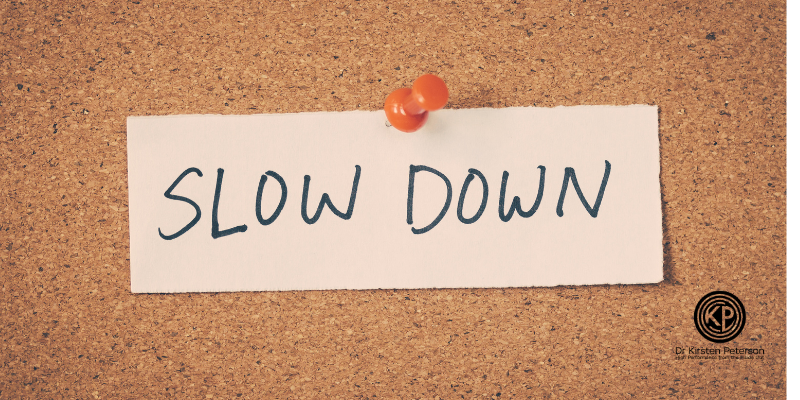For those who weren’t playing along with my last newsletter, I spoke about the “inverted U” curve that defines the relationship between resilience and grit. In that, it doesn’t take much resilience to be non-gritty, but then it becomes a virtuous cycle of increased grit and resilience with one feeding the other…until it is not. Chronic over-gritting kills our resilience.

Today, it’s all about the traps we need to overcome and what we can do when both resilience and grit are not happening – when we are caught in the dreaded “blue circle zone.”
So why do we sometimes struggle even to get going, much less persevere when the going gets tough? Here are some common mindset pitfalls:
1. It’s gotta be perfect before I try it out. Or that’s the story we tell ourselves. And because “perfect” is unattainable, we can cheerfully let ourselves off the hook. After all, we are still working on said thing. Without the risk that comes from seeing how other people react to it, or worse, finding out that our idea or new skill really isn’t all that good. Perfectionism as an aspiration can sound like a good and laudable idea, but scientific evidence strongly points the other way: holding out for perfection is ultimately a performance detractor. Perfectionists often dawdle AND beat themselves up for not being, well, perfect.
The play for perfectionism? First, take action…now. Test the theory that perfect is the only way. Action, as they say, precedes clarity…which is far more valuable than a perfect pre-effort that never sees the light of day. Second, to dampen the anticipated pain in taking that kind of action-y, “out there” risk, try labeling your action as an experiment. Holding our efforts more lightly–as an experiment, not a final project–can act to lower the threat that is poison to perfectionists.
2. What if…? What if it’s not good enough? What if I’m not good enough? What if people don’t like it? We can literally paralyze ourselves into complete inactivity when we ask questions like these, all of which start with the same two words. What is worse is that they can take on a “thought-loop” life of their own with half-baked, worst-case scenarios rattling threateningly in our minds…stopping us with the self-inflicted wounds of doubt.
The cure for what if? As I have argued elsewhere, the “what if?” question becomes so powerful, and not in a good way, because we don’t answer the question. Question: What if I don’t make the team? Potential answer: I will be sad and disappointed, but if I want to keep going, I will look for lessons in the loss and come back better prepared next time. Another, simpler, but no less effective answer? I’ll figure it out. Because you will. Try this experiment and think back to the last what-if scenario you conjured up. Win, lose, success, failure, did you get through? Of course you did, or you wouldn’t be reading this right now.
3. The “talented and gifted” curse. If I think (or have been told) that I am just a natural talent, then whatever challenge I face has to come easier to me than other people, otherwise, it means that I’m not actually talented. Thanks to social psychologist Carol Dweck for this important insight. It turns out that any label we place on ourselves (or have placed upon us) can undermine our grit in a hot second. The way this plays out is when we start to do something we think might be difficult, our label can actually limit the amount of effort we put into the challenge.
The antidote for the T&G curse? Shrug off the static label in favour of verbs – action words that end in “ing.” Rather than thinking of myself as smart, I reward myself for perseverING. Rather than putting myself doing for my lack of skill, I reward myself for my persistence in learnING. The use of verbs rather than labels frees us to keep taking action without the burden of pre-conceived expectations about how things “should” turn out.
4. Everyone else looks so effortless. Or at least coping better than me. And thus the slide into inactivity, procrastination, or lacerating self-talk can start. The two big problems with this mindset? (1) it is so often so inaccurate, and (2) we are basing our judgments on appearances, not the internal reality of the other person. So unless we ask them, we don’t know how potentially tough someone else is doing it, like the swan who appears majestic above the water, only to be paddling furiously underneath.
What to do when “comparison-its” strikes? Consider the possibility that all is not as it seems, that we all have our unique journey in this life, and maybe it’s best to just get doing what needs doing. Kristin Neff, self-compassion expert, suggests that we remind ourselves of our common humanity – rather than drilling down on our perceived lack in comparison to others as some kind of unique flaw, we consider the truth that everyone suffers on the altar of achievement. It’s part of being human.


